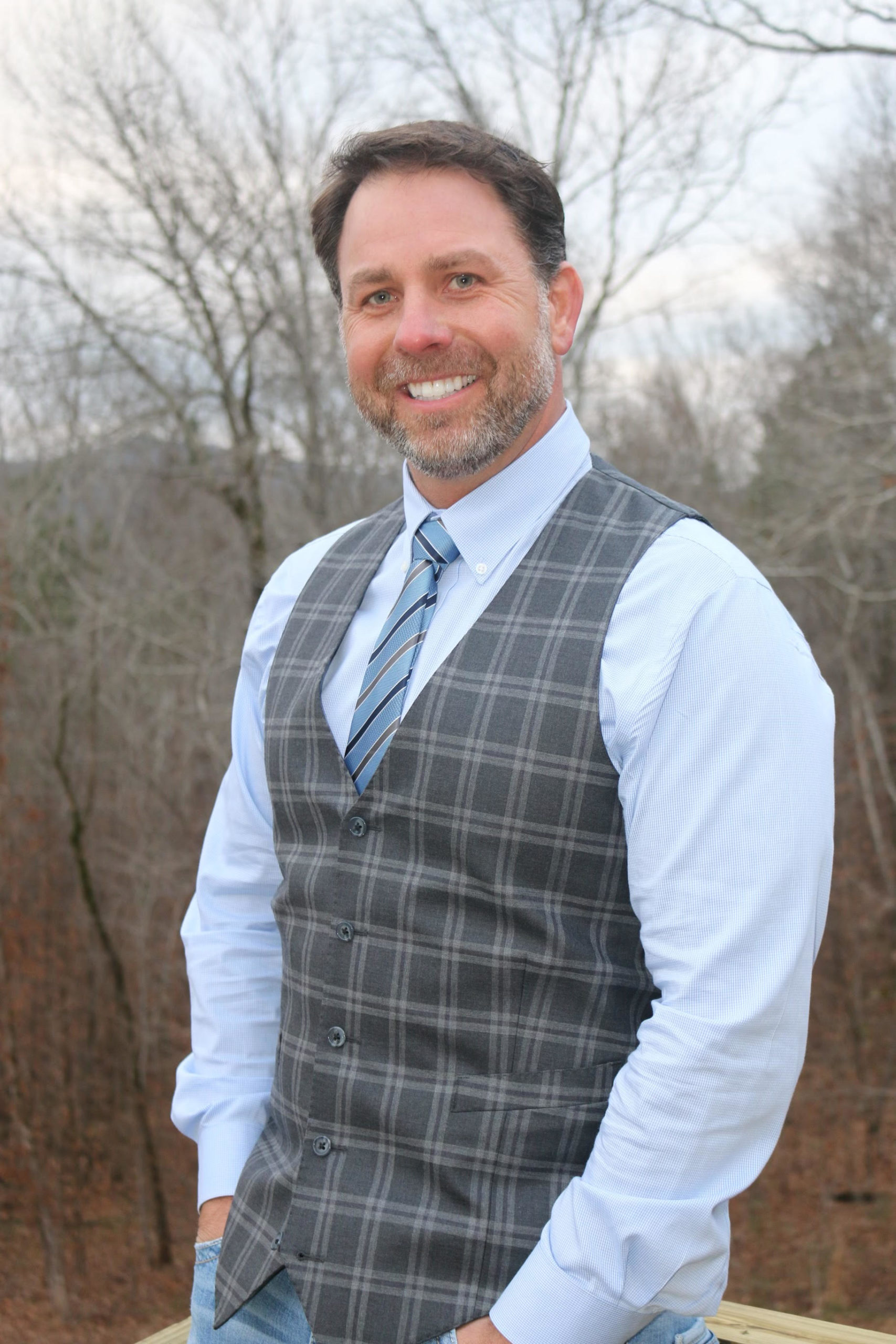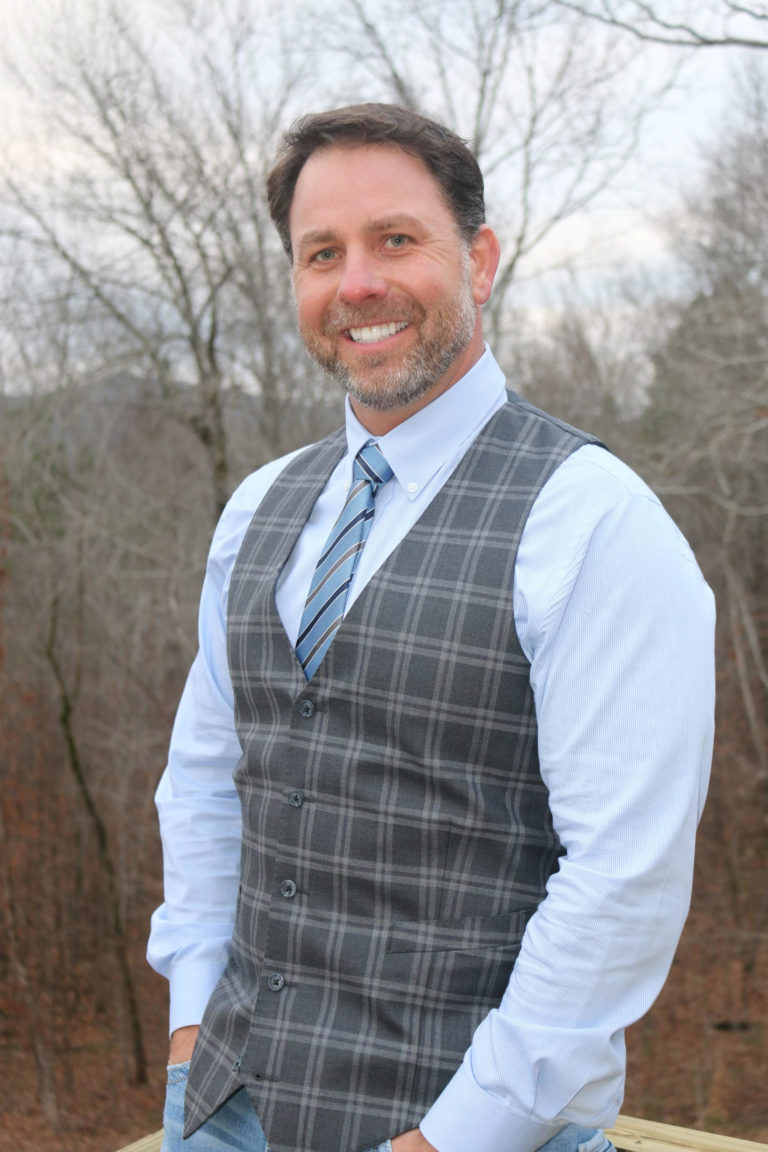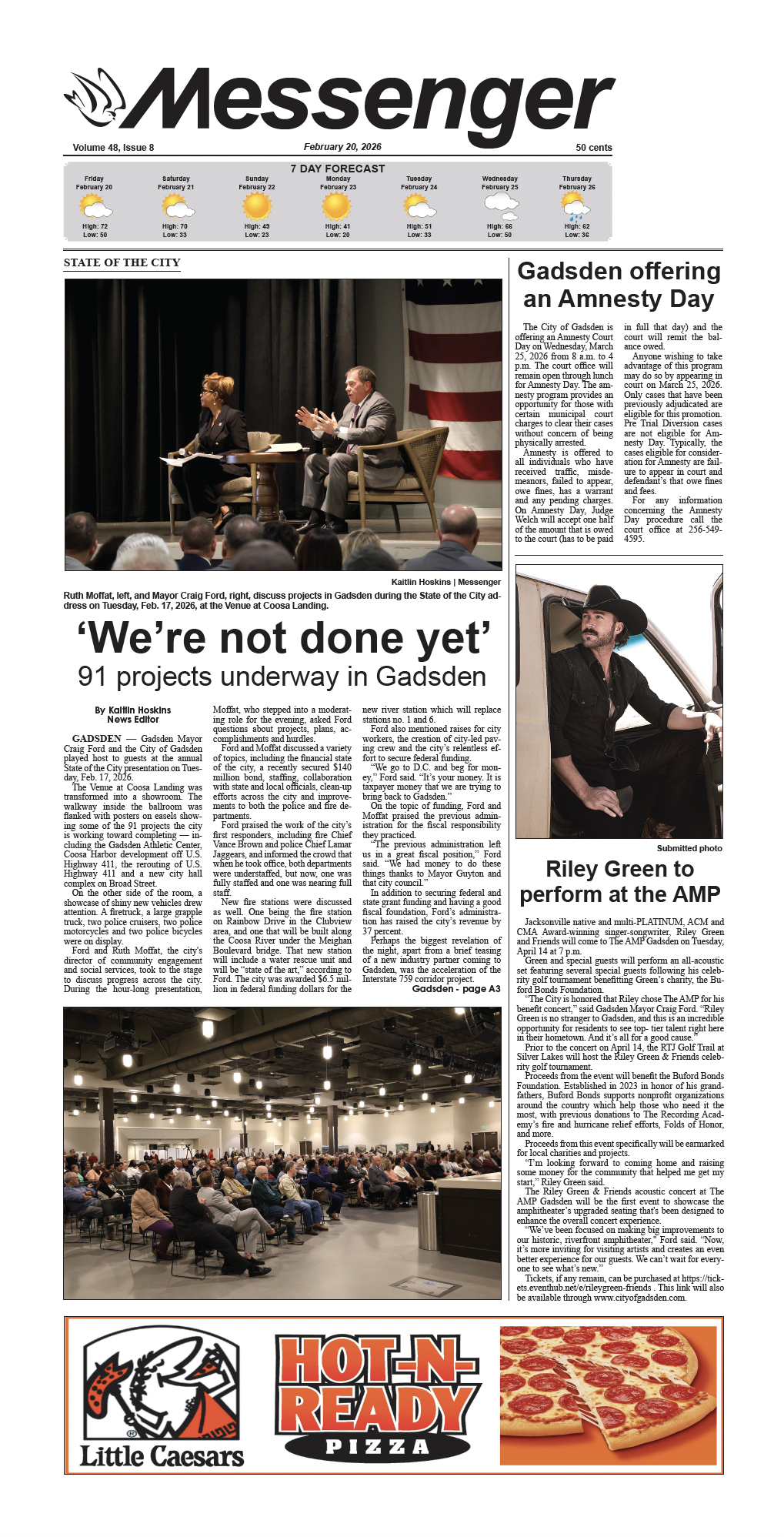Watch the full interview here.
For those who don’t know you, give a brief bio – where you were born and raised, your professional career and your involvement with the community.
“I graduated from West End High School in 1993 and then went on to Gadsden State from there. After I graduated in ‘96, I joined the Alabama National Guard and finished boot camp in ‘97, then I got hired on the Counter Drug Program. I’ve been married 25 years [this year]. We have two kids – our daughter lives in Nashville and our son graduated from Sardis High School last year.
I spent 22 years in the National Guard – 20 active duty years. 18 of those years were with the 20th Special Forces Group where I was an intel analyst. I retired in that as an E-8 [Master Sergeant]. It’s a weird dynamic because you get to be on active duty and in the guard. You get to do a lot of different kinds of things. I got hired on the Counter Drug program. I went to work for U.S. Customs in Birmingham and then I was transferred into different narcotics agencies.
When I was first hired, I was a medic, but as the program evolved I became a criminal analyst. It was very exciting. I was deployed three times to Afghanistan and Africa. Dealing with these things, you get the feel of a leadership position. I’ve had a very interesting career.
I retired in 2018 from the military, and became an Etowah County Commissioner in 2020. I bought a business for my retirement. I tell people that when I retired, I bought a job. I own that small business on the west side, it’s a grocery store [Lil’ Burton’s]. So, I know the aspects of retirement, and yet I go to work every day. Now, I spend my days running a business and being a county commissioner.”
What initially inspired you to enter the military?
“My plan was to be a doctor [and to enter the military to pay for schooling]. I went on as a medic, and I was going to go to Texas to be a doctor. Ultimately, that failed. That’s when I got hired on the program. So, I had a fun career catching bad guys.”
How do you think being in the military has given you a different perspective?
“Having different roles in the military gives you the ability to wear multiple hats. In 20th Special Forces, I was anything from a First Sergeant and NSA Trusted Agent to the Senior Criminal Analyst with the Counter Drug Program.
You wear multiple hats, so you have to be multifaceted. You have to be able to make decisions and have common sense. Because you’re a citizen soldier, you have to have self-discipline. There’s just a lot of things that influence you, and you do those things in a leadership position or [perform roles] even when you have leadership over you.
These experiences [you gain] when you deploy…you deal with foreign nationals when you’re in their country and you have to abide by their rules. They bring you back and it makes you realize that there’s a lot more going on than just in your hometown.
What do you think that participating in these different roles taught you about leadership?
“It’s taught me how to work with others and to multitask, how to make your decision-making process right because you may have a five-man team or be working with hundreds of soldiers. You have to understand that just because it’s my idea doesn’t mean it’s the right idea. You have to have communication skills. I have to understand your needs and take those needs into consideration.
You have to compartmentalize information and distribute information. You have to make sure everyone has the correct information and then put that stuff out.”
You’ve mentioned service a lot during your campaign. How would you describe service and what it means to you?
“We have to find how we’re going to serve best, serve in the capacity we do best, and find your strongest point so you can do the same. For example, preachers are preachers for a reason – that’s their calling. I think one of my greatest strengths is [seeing the potential in others] finding those strong points, those best qualities and utilizing them to the best of my ability and yours [to make us successful together]. I wasn’t the best leader, but because I had good men around me, they made us successful.”
What first motivated you to run for county commissioner?
“After I retired in ‘18, and I bought my business, I knew I wanted to do more. I knew I wasn’t finished serving. I wanted to stay involved. The County Commission seat was open. I ran and won. I want to be an asset [for our community].”
What then motivated you to run for District 29?
“Just to continue [serving]. With that military mindset I have, I don’t think that one position is greater than the other. It’s an opportunity that’s come open. We need a strong leader and I think I fit that role. I just want to continue progressing and moving and serving the community. I want to continue working for the people and the community around us.”
What characteristics do you feel make an effective representative?
“Listening – we have to listen to the needs of the people, and be able to work with our local leaders, legislatures and our mayors. I have a great relationship with every mayor and every legislature.
I want to be able to have an open-door policy and say, ‘If you need something come in, come see me.’ I’ve done everything from wait tables to build mobile homes, to [travel] around the world fighting for our country. I’ve done it all and I have common sense. I have enough sarcasm about me that if you do something I don’t like, or say something I don’t believe in, I’ll just call you out.
I’m just real. I’m like the guy next door. I’m not any different than the next guy driving a car down the road. I’m just like you.”
How do you think you maintain those relationships and what is the importance of that collaboration?
“I’m a positive individual. If I don’t agree with what somebody may or may not say, I’m going to tell you one-on-one, I’m not going to blast you on Facebook. You have to have a positive character about you. You can’t be afraid of going to someone’s office and saying, “Hey man, we have this issue, how can we work it out?”
You can’t be afraid to take criticism from someone who may or may not like what you’re doing. I’ve been blasted by colonels and sergeant majors and I’ve done plenty of things wrong, so it’s not like I’m not going to do things wrong. It’s not like I’m not going to fail. I’m not afraid to tell you that I’ve made a mistake, because I’ve made plenty of them.
In leadership you’re not going to make everybody happy, but know that when I made a decision it is because I felt it was the best for my team or for the unit or the people.
Over the 20 years that I was in the Counter Drug Program, we faced many financial hardships, mostly because of budget reasons. I would either deploy or I would go do training to come off their orders so that somebody else could stay on [the program]. They loved that because I was about the program. I was program first, Jamie second. They knew that about me.”
What skill-set or insight do you have that you think would prove beneficial to your role in District 29, should you be elected?
“Decision-making, multitasking, common sense, and just being an everyday person [are some of my skills]. Just having what it takes to figure things out and having an open-door policy. Being around the world and having the understanding that ‘This is what it takes,’ and listening to you. I’m going to do what it takes to make it work. I’m going to be honest with you. I’m not just telling you an answer to make you feel good.”
Describe your approach to serving as representative. What are some short-term and long-term goals you hope to manifest?
“A short-term goal would be bringing jobs in to improve the quality of life of Etowah County. For the long term, improving our education system and the infrastructure. Generations down the road will continue to be affected by jobs being brought into our county.
I want to get with each individual mayor or leader and see what their vision is for their town – maybe 10, 15, even 50 years into the future. Each community elects their mayor based on what their vision is and by knowing this, we can get on the same page. I can take this information and push for it. So once Montgomery comes with a plan, we know which town wants it and it doesn’t get bounced around between towns who don’t want something that big. We know who to send [industry] to. There’s not one plan for all of Etowah County, it’s the [individual] community’s plans that the county understands.”
What do you think is the best way to collaborate and have all of them work together?
“Communication. We just have to talk to each other. It’s not just one person who’s going to gain from it, and at the end of the day, it’s for the county – the county is going to benefit from it. It’s for the people.”
You consider the top three issues in our state to be economy, education and infrastructure. Where do you see needs for improvement in these areas?
“We have to bring in a big industry. We have to bring in something so that our kids and their kids will have jobs and stay. We want to have nice manufacturing jobs to bring people in and to build [our community]. That [industry] will bring money in, which will improve infrastructure and that will help the school system. We need like-minded people running for our legislature and mayors who have the same vision. We need to have strong education members who have like-minded plans for our kids.”
You have students who go to college and some who go into the workforce right after school. Only 25 percent of our kids have bachelor’s degrees. 75 percent go into the workforce. We need to streamline those kids and understand that. We get it out of our head that we are failures as parents if our kids don’t go into college and instead go right into the workforce. We need to guide them into it and pave the way for success.”
You’re also a small business owner. What is the importance of small businesses in our area?
“Small business is the backbone of our local economy. We have to protect them – they are bigger than life. During the COVID-19 pandemic, they were closing down small businesses. We can’t let that happen. Who is to say that one is a necessity and one is not? When it is your livelihood it’s a necessity.
We need strong leaders in Montgomery saying, ‘We’re not going to let anybody regulate and shut down anything.’ I don’t think we should be mandating or regulating anything. We live in a free country. I’m huge about the free marketing business.”
Describe your first action, should you be elected.
“I want to get all the legislatures together and get Gadsden [and all other municipalities] and everyone on the same page. I want to get them talking and working together to bring something here. I want everyone to know who I am and to work to progress forward. My vision is to see what everyone else envisions, so I can push for that.”
What can district 29 expect from you as Representative, should you be elected?
“An open-door policy. They should expect to see me at ball games; they should expect to see me doing their work. I will represent them to the best of ability and fight for them. I will do their wishes and accomplish whatever they need done.”
If there’s a message you’d like to send to voters, what would you say to them?
“Just know that I have been serving you all my life, and for half of my life I’ve been working hard for the people. I’ve been fighting for your right to vote and to do the things that you enjoy. I want to continue to do that.”





